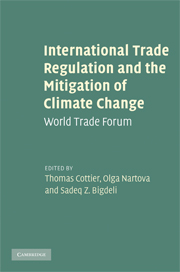Book contents
- Frontmatter
- Contents
- Contributors
- List of figures
- List of tables
- List of abbreviations
- Preface
- PART I Climate change mitigation: scientific, political and international and trade law perspectives
- 1 Earth in the greenhouse — a challenge for the twenty-first century
- 2 A survey of Kyoto tools for greenhouse gas reductions: speculations on post-Kyoto scenarios
- 3 International environmental law and the evolving concept of ‘common concern of mankind’
- 4 Domestic and international strategies to address climate change: an overview of the WTO legal issues
- PART II Climate change mitigation and trade in goods
- PART III Trade in renewable energy sources
- PART IV Climate change mitigation and trade in services
- PART V Climate change and technology transfer, investment and government procurement: legal issues
- PART VI Institutional challenges and the way forward
- Index
2 - A survey of Kyoto tools for greenhouse gas reductions: speculations on post-Kyoto scenarios
from PART I - Climate change mitigation: scientific, political and international and trade law perspectives
Published online by Cambridge University Press: 04 August 2010
- Frontmatter
- Contents
- Contributors
- List of figures
- List of tables
- List of abbreviations
- Preface
- PART I Climate change mitigation: scientific, political and international and trade law perspectives
- 1 Earth in the greenhouse — a challenge for the twenty-first century
- 2 A survey of Kyoto tools for greenhouse gas reductions: speculations on post-Kyoto scenarios
- 3 International environmental law and the evolving concept of ‘common concern of mankind’
- 4 Domestic and international strategies to address climate change: an overview of the WTO legal issues
- PART II Climate change mitigation and trade in goods
- PART III Trade in renewable energy sources
- PART IV Climate change mitigation and trade in services
- PART V Climate change and technology transfer, investment and government procurement: legal issues
- PART VI Institutional challenges and the way forward
- Index
Summary
The United Nations regime for the protection of the global climate contains provisions related to trade. So far, there has been no conflict between climate protection and existing rules for international trade. But, in the future, conflicts may occur in a number of sectors when new investments in both mitigation and adaptation will be mobilised, and the development and transfer of environment friendly technologies to developing countries may pose problems related to intellectual property rights (IPRs). The Johannesburg Rio + 10 agreement provides the basic principle for mutual supportiveness of trade and multilateral environmental agreements (MEAs), in particular for climate protection.
The threat of climate change
Given its potential impact on ecosystems and human activities, climate change is recognised as one of the most important challenges for this century. Given also that greenhouse gas (GHG) emissions resulting from anthropogenic activities, such as the burning of fossil fuels, agriculture and deforestation, are among the causes of the recently observed changes in the climate system substantial mitigation action and adaptation is urgently needed. The measures adopted are relevant to trade.
Provisions of the UNFCCC and its Kyoto Protocol relevant to trade
The United Nations Framework Convention on Climate Change (UNFCCC) and its Kyoto Protocol (KP) make numerous references to trade. The decisions adopted for their implementation by their supreme organ, the Conference of the Parties (COP), consistently provide opportunities for both mutually supportive and conflicting situations with the current rules on international trade.
- Type
- Chapter
- Information
- International Trade Regulation and the Mitigation of Climate ChangeWorld Trade Forum, pp. 13 - 20Publisher: Cambridge University PressPrint publication year: 2009



